Volume 1: Liberation towards Justice
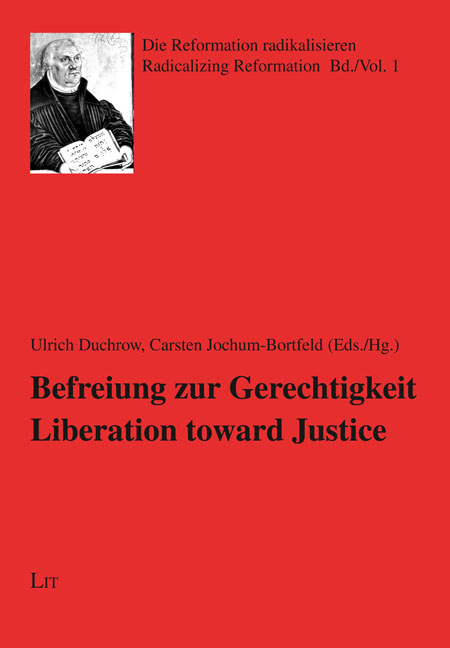
Volume 1 renews the question of “justification through faith”. What does it mean for Paul, living under the law of the Roman Empire, what under the law of the market? Is justification to be read in an anti-Jewish/islamic perspective? What is the structural sin making all people co-perpetrators? God’s liberation for justice mainly happens through the formation of Tora-led new messianic communities, which practice solidarity instead of egocentric individualism. This is consistent with Luther’s rejection of “salvation for sale” and his systemic critique of early capitalism.
Ulrich Duchrow, Carsten Jochum-Bortfeld (Eds.)
Befreiung zur Gerechtigkeit. Liberation towards Justice
Series: Die Reformation radikalisieren / Radicalizing Reformation , Vol. 1
Berlin: LIT Verlag, 2015
ISBN: 978-3-643-12853-9
Vol. 2: Liberation from Mammon
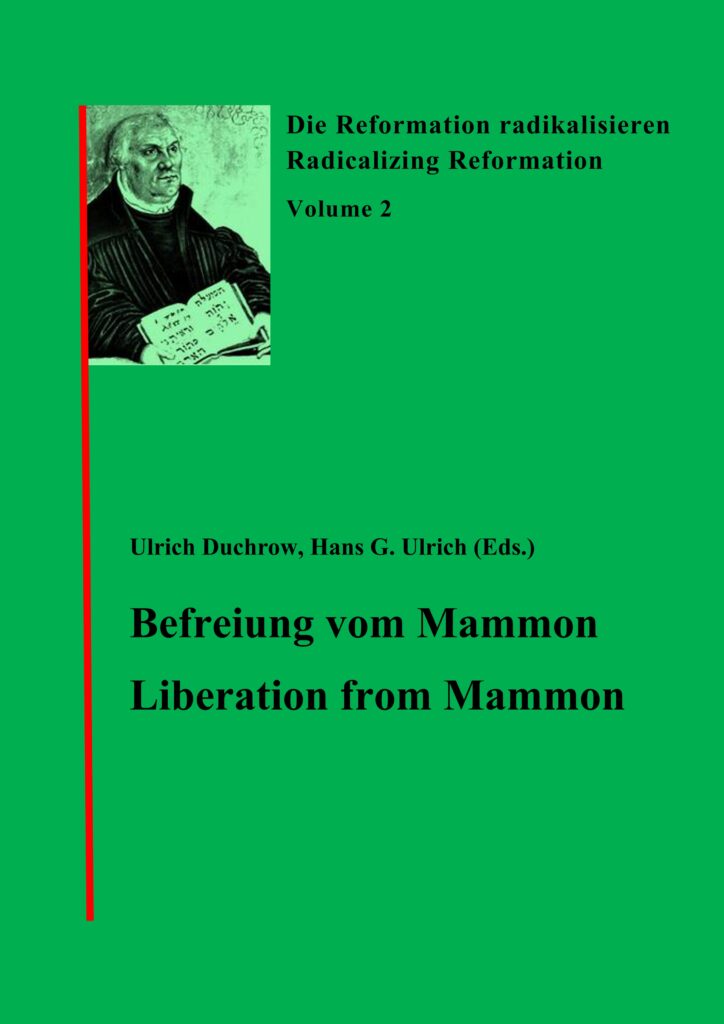
This issue connects Bible, Reformation and today’s crisis: money in religious, political, economic and mental perspective. In the Old and New Testaments the imperial rule of money is understood as structural sin, making all people to co-perpetrators. God’s liberation happens as the formation of Torah led and new messianic communities, which practice solidarity instead of egocentric individualism. This corresponds to Luther’s rejection of purchasable salvation and his systemic critique of individualism and early capitalism.
Ulrich Duchrow, Hans G. Ulrich (Eds.)
Befreiung vom Mammon. Liberation from Mammon
Series: Die Reformation radikalisieren / Radicalizing Reformation, Vol. 2
Berlin/Münster: LIT Verlag, 2015
ISBN: 978-3-643-12847-8
Vol. 3: Politics and Economics of Liberation
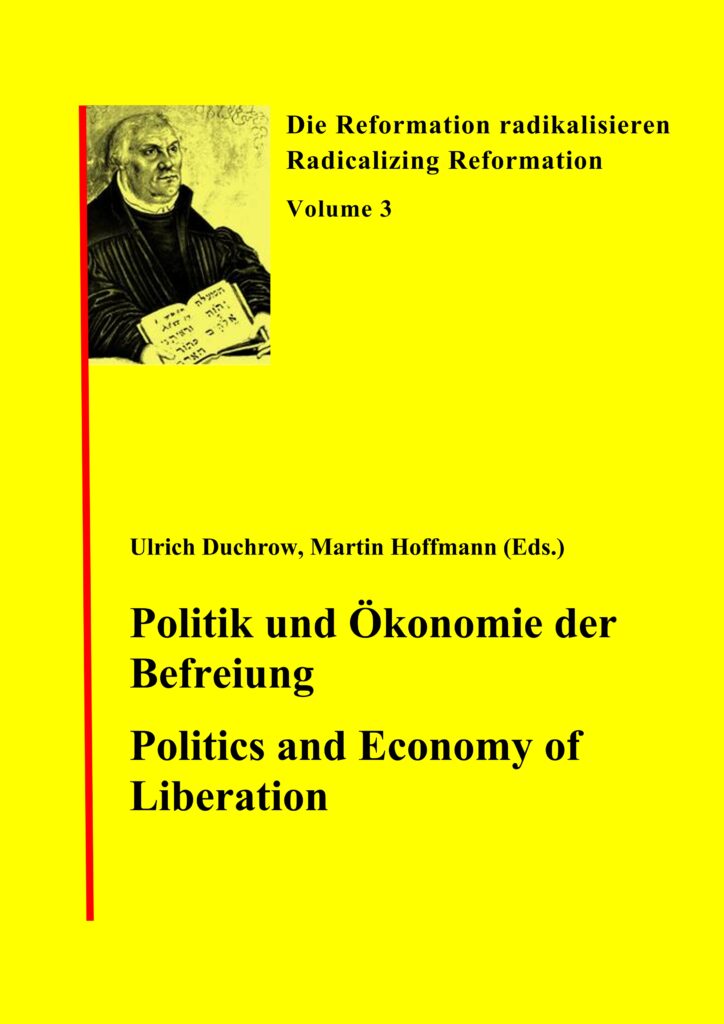
Luther systemically criticizes ealy capitalism. He is aware of the religious character of capitalism on the basis of the first commandment. His writings on trade and usury (finance) only marginally effected later protestantism (cf. e.g. Winstanley in the 17th century) but mainline Lutheranism did not follow this critical line. Only recently the potentials of Luther’s position for the theological critique of neoliberalism and for a political ethics of partisanship and reconciliation were rediscovered.
Ulrich Duchrow, Martin Hoffmann (Eds.)
Politik und Ökonomie der Befreiung. Politics and Economics of Liberation
Reihe: Die Reformation radikalisieren / Radicalizing Reformation, Vol. 3
Berlin/Münster: LIT Verlag, 2015
ISBN: 978-3-643-12973-4
Vol. 4: Liberation from Violence for Life in Peace
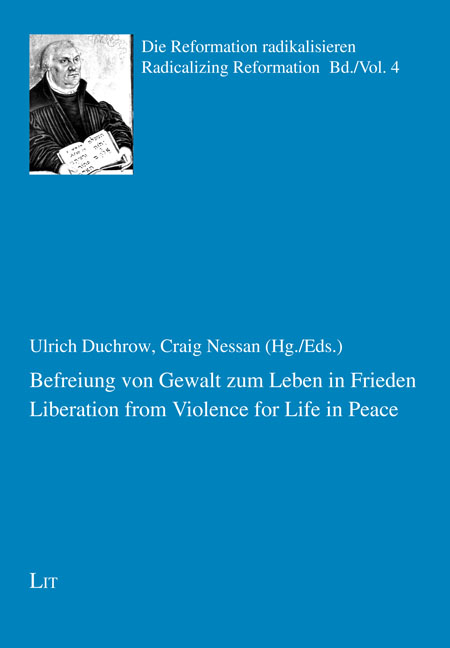
Volume 4 explores troubling questions about the Reformation legacy in relation to the peasants war, Anabaptists, Jews, and Muslims. The ecumenically diverse authors – Lutheran, Mennonite, and Reformed – analyze the limitations of the Reformation in its own historical context and provide constructive theological and ethical reflection for addressing the imperatives of global economic justice, the cry of the earth, radical peacemaking, and interreligious reconciliation. How do we achieve a New Reformation to address the crises of our time?
Ulrich Duchrow, Craig Nessan (Eds.)
Befreiung von Gewalt zum Leben in Frieden. Liberation from Violence for Life in Peace
Reihe: Die Reformation radikalisieren / Radicalizing Reformation , Vol. 4
Berlin: LIT Verlag, 2015
ISBN: 978-3-643-12974-1
Vol. 5: Church – Liberated for Resistance and Transformation
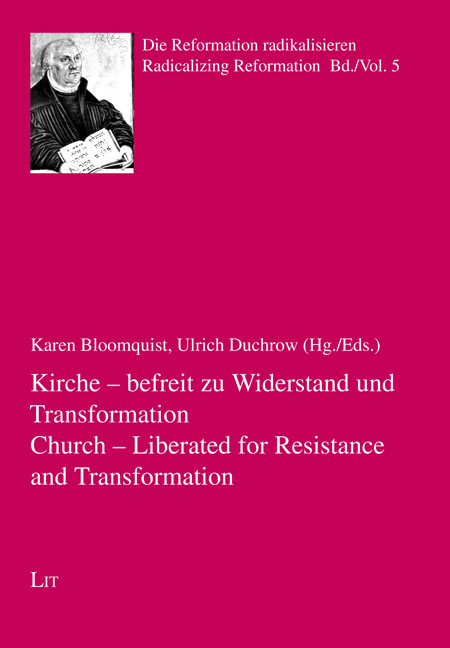
The cross is a sign of evil, of consolation for all those tortured and suffering, a sign of hope, of liberation. Christ takes on the socio-political, cultural and economic conditions of those who have been deprived of their rights. The church needs to risk its sustainability by being with and for the poor. The Spirit works freely in people and the world, therefore also in other religions besides Christianity. Rather than only focused on the person or individual, a more communal ecclesial focus for resistance and transformation is essential.
Karen Bloomquist, Ulrich Duchrow Eds.)
Kirche – befreit zu Widerstand und Transformation. Church – Liberated for Resistance and Transformation
Reihe: Die Reformation radikalisieren / Radicalizing Reformation , Vol. 5
Berlin: LIT Verlag, 2015
ISBN: 978-3-643-12975-8
Vol. 6: Radicalizing Reformation – Perspectives from North America
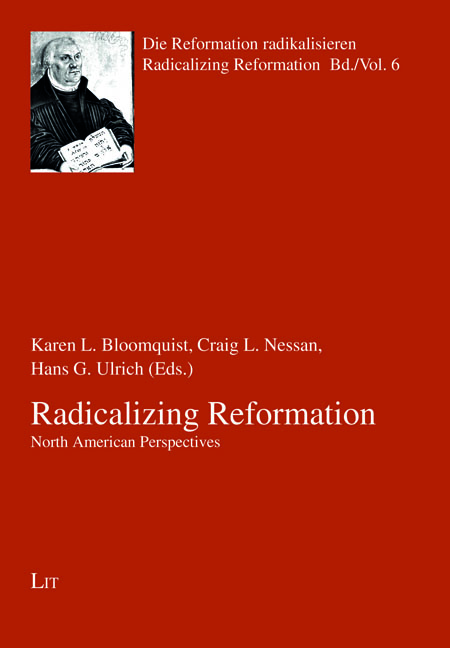
This book provides critical perspectives from North American theologians involved in the international project, “Radicalizing Reformation – Provoked by the Bible and Today’s Crises.” This project explores the radical roots of what was ignited 500 years ago, in order to bring more attention to the systemic challenges that must be addressed today, drawing from both the strengths and the weaknesses of the Reformation legacy.
Authors in this all-English volume include Brigitte Kahl, Paul S. Chung, Samuel Torvend, Cynthia Moe-Lobeda, Craig L. Nessan, Peter Goodwin Heltzel, Charles Amjad-Ali, Karl Koop, Wanda Deifelt, Vitor Westhelle, and Karen L. Bloomquist. Each has also been published in one of the previous five volumes. This volume also includes background on the overall project, the 94 theses, and a guide for discussion in local contexts.
Karen L. Bloomquist, Craig L. Nessan, Hans G. Ulrich (Eds.)
Radicalizing Reformation. Perspectives from North America
Reihe: Die Reformation radikalisieren / Radicalizing Reformation , Bd. 6
Wien/Zürich: LIT Verlag, 2016
ISBN: 978-3-643-90772-1
Vol. 7: Religionen für Gerechtigkeit in Palästina-Israel. Jenseits von Luthers Feindbildern.
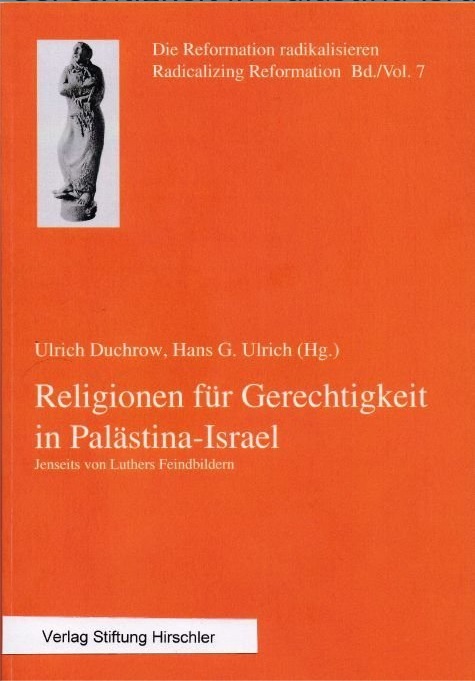
Band 7 bezieht die Realität in Palästina/Israel auf die Vision des Paulus vom Zusammenleben der Juden und Völker in der Gemeinschaft des Messias Jesus. Luther deutet die Unterscheidung von Gesetz und Evangelium falsch, indem er daraus Feindbilder entwickelt. Diese sind heute wiederbelebt, denen auch aus muslimischer Sicht entschieden widersprochen wird. Zwei jüdische Beiträge kritisieren den Missbrauch des christlich-jüdischen Dialogs zur Legitimation des Staates Israel aus der Sicht der Propheten und der bekennenden Kirche. Diese zwei jüdischen Beiträge dürften den Deutschen Koordinierungsrat der Gesellschaften für Christlich-Jüdische Zusammenarbeit (DKR) am meisten ob dieses Buches erzürnt und zu seiner Erklärung mit massiven Verunglimpfungen veranlasst haben. Der Beitrag eines israelischen Ökonomen zeigt, wie der Westen die Völkerrechtsbrüche des Staates Israel ermöglicht. Was heißt das theologisch und politisch für uns? Darüber erhoffen die AutorInnen eine öffentliche Debatte statt des heute üblichen leichtfertigen Vorwurfs des Antisemitismus als einziger Antwort, wenn israelische Rechtsbrüche kritisiert werden – ein Verhalten, das neuen Antisemitismus generiert.
Ulrich Duchrow, Mark Braverman (Eds.)
Religionen für Gerechtigkeit in Palästina-Israel. Jenseits von Luthers Feindbildern
Series: Die Reformation radikalisieren / Radicalizing Reformation , Vol. 7
Third and updated edition
Otterstadt/Speyer: Verlag Stiftung Hirscher, 2020
ISBN: 978-3-9818916-2-1
The articles of this publication are accessible online in English:
Vol. 8: Religionen für Gerechtigkeit in Palästina-Israel. Band 2
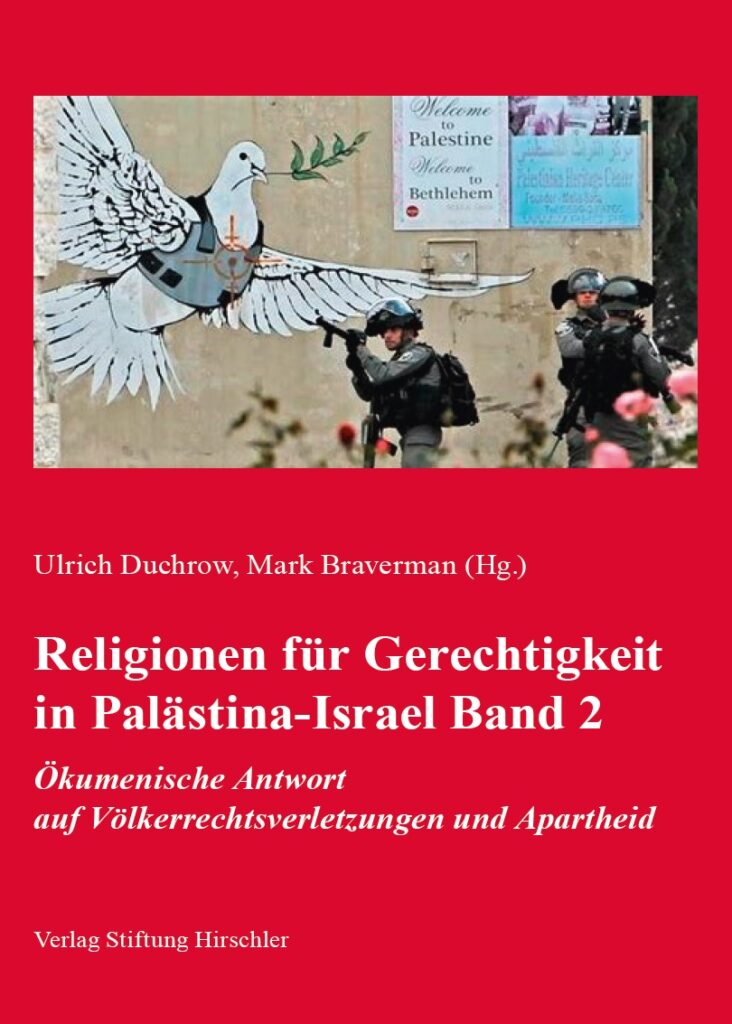
Band 2 von „Religionen für Gerechtigkeit in Palästina-Israel“ antwortet auf den Aufruf der Vollversammlung des Ökumenischen Rates der Kirchen (ÖRK) an die Mitgliedskirchen 2022, zu prüfen und zu entscheiden, ob es sich beim jetzigen Staat Israel um ein Apartheidsystem handelt. Diese Frage bejahen viele Menschenrechtsorganisationen, die UNO-SonderberichterstatterInnen für die Palästinensergebiete, viele Kirchen und jüdische Einrichtungen. Dies wird in einem 1. Teil aus kritisch-jüdischer Perspektive, den Traditionen der Bekennenden Kirche und den Erfahrungen im Kampf gegen die südafrikanische Apartheid analysiert und bewertet. Auch wird völkerrechtlich der Stand der Ermittlungen gegen Israel im Internationalen Strafgerichtshof und Internationalen Gerichtshof dargestellt.
Der 2. Teil untersucht, wie der Antisemitismusvorwurf benutzt wird, um jegliche Kritik an den Völkerrechts- und Menschenrechtsverletzungen Israels abzuweisen. Um dies zu verstehen, muss man durchschauen, wie die Arbeitsdefinition des Antisemitismus der International Holocaust Remembrance Alliance (IHRA) zu diesem Zweck manipuliert wurde, welche Rolle die israelische Propagandabteilung Hasbara spielt, welche Mechanismen besonders in Palästina-Israel, Deutschland und USA am Werk sind und wie der christlich-jüdische Dialog in einen Deal verwandelt wurde.
Im 3. Teil geht es um Visionen und Alternativen auf der Basis einer klaren biblischen Koppelung von Land und Recht und der universalen Perspektive des Völkerfriedens einschließlich interreligiöser Toleranz. Besonders wichtig ist auch die Möglichkeit, die Erinnerungen an die israelische Staatsgründung Israels und die palästinensische Katastrophe (Nakba) – in ihrem Bezug auf Deutschland – aus der Polarisierung zu befreien, um die Traumata zu heilen. Allerdings wird – so der letzte Beitrag – die Nakba für das palästinensische Volk nur dann zu überwinden sein, wenn besonders die USA und Deutschland ihre politische und finanzielle Unterstützung des israelischen unterdrückerischen Apartheidsystems beenden.
Ulrich Duchrow, Mark Braverman (Eds.)
Religionen für Gerechtigkeit in Palästina-Israel. Band 2
Series: Die Reformation radikalisieren / Radicalizing Reformation , Bd. 8
Otterstadt/Speyer: Verlag Stiftung Hirscher, 2023
ISBN: 978-3-9825538-1-8